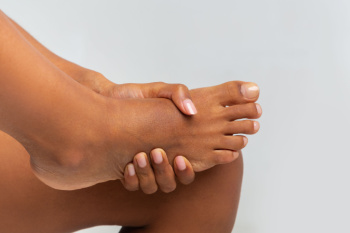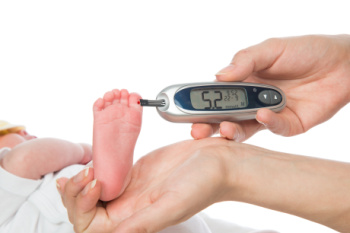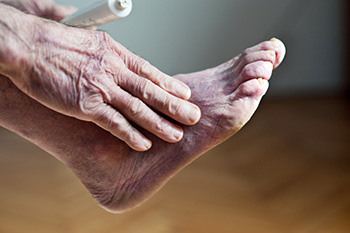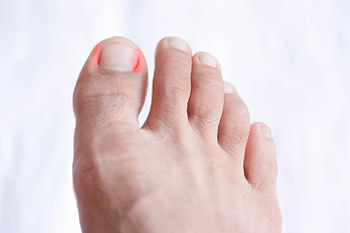June 2024
Caregiver Help in Everyday Foot Care
 Caregivers play a vital role in maintaining the foot and toenail health of those they assist. Regular inspection of the feet is important, checking for any signs of redness, swelling, cuts, or infections. Toenails should be trimmed straight across to prevent ingrown toenails, and the edges can be gently filed to remove sharp corners. Keeping feet clean and dry helps prevent fungal infections, while moisturizing can prevent dry, cracked skin. It is also important to ensure that shoes and socks fit properly to avoid pressure points and blisters. Elevating the feet periodically can improve circulation, especially for those who are less mobile. Any signs of infection or persistent foot problems should be addressed promptly. If you are a caregiver, it is suggested that you include a podiatrist on the healthcare team to ensure specialized care and early intervention for any foot-related issues.
Caregivers play a vital role in maintaining the foot and toenail health of those they assist. Regular inspection of the feet is important, checking for any signs of redness, swelling, cuts, or infections. Toenails should be trimmed straight across to prevent ingrown toenails, and the edges can be gently filed to remove sharp corners. Keeping feet clean and dry helps prevent fungal infections, while moisturizing can prevent dry, cracked skin. It is also important to ensure that shoes and socks fit properly to avoid pressure points and blisters. Elevating the feet periodically can improve circulation, especially for those who are less mobile. Any signs of infection or persistent foot problems should be addressed promptly. If you are a caregiver, it is suggested that you include a podiatrist on the healthcare team to ensure specialized care and early intervention for any foot-related issues.
Everyday foot care is very important to prevent infection and other foot ailments. If you need your feet checked, contact one of our podiatrists from Ankle & Foot Care Center. Our doctors can provide the care you need to keep you pain-free and on your feet.
Everyday Foot Care
Often, people take care of their bodies, face and hair more so than they do for their feet. But the feet are a very important aspect of our bodies, and one that we should pay more attention to. Without our feet, we would not be able to perform most daily tasks.
It is best to check your feet regularly to make sure there are no new bruises or cuts that you may not have noticed before. For dry feet, moisturizer can easily be a remedy and can be applied as often as necessary to the affected areas. Wearing shoes that fit well can also help you maintain good foot health, as well as making it easier to walk and do daily activities without the stress or pain of ill-fitting shoes, high heels, or even flip flops. Wearing clean socks with closed shoes is important to ensure that sweat and bacteria do not accumulate within the shoe. Clean socks help to prevent Athlete’s foot, fungi problems, bad odors, and can absorb sweat.
If you have any questions please feel free to contact our office located in Jupiter, FL . We offer the newest diagnostic and treatment technologies for all your foot and ankle needs.
The Importance of Diabetic Foot Care
 For people with diabetes, proper foot care is critical due to the risk of neuropathy and poor circulation, which can lead to severe complications. High blood sugar levels over time can damage nerves and reduce blood flow, causing numbness and decreased healing ability. This makes the feet more susceptible to injuries, infections, and ulcers, which can develop unnoticed and worsen quickly. To maintain foot health, individuals with diabetes should inspect their feet daily for cuts, blisters, redness, or swelling. Keeping feet clean and dry, moisturizing to prevent cracks, and trimming nails carefully are essential steps. Wearing properly fitted shoes and socks that reduce pressure and friction can prevent sores. Regular foot exercises and avoiding smoking may help to improve circulation. Failure to care for diabetic feet can lead to severe infections, gangrene, and even amputations. If you have diabetes, it is strongly suggested that you are under the care of a podiatrist for regular check-ups and specialized treatment plans.
For people with diabetes, proper foot care is critical due to the risk of neuropathy and poor circulation, which can lead to severe complications. High blood sugar levels over time can damage nerves and reduce blood flow, causing numbness and decreased healing ability. This makes the feet more susceptible to injuries, infections, and ulcers, which can develop unnoticed and worsen quickly. To maintain foot health, individuals with diabetes should inspect their feet daily for cuts, blisters, redness, or swelling. Keeping feet clean and dry, moisturizing to prevent cracks, and trimming nails carefully are essential steps. Wearing properly fitted shoes and socks that reduce pressure and friction can prevent sores. Regular foot exercises and avoiding smoking may help to improve circulation. Failure to care for diabetic feet can lead to severe infections, gangrene, and even amputations. If you have diabetes, it is strongly suggested that you are under the care of a podiatrist for regular check-ups and specialized treatment plans.
Diabetic foot care is important in preventing foot ailments such as ulcers. If you are suffering from diabetes or have any other concerns about your feet, contact one of our podiatrists from Ankle & Foot Care Center. Our doctors can provide the care you need to keep you pain-free and on your feet.
Diabetic Foot Care
Diabetes affects millions of people every year. The condition can damage blood vessels in many parts of the body, especially the feet. Because of this, taking care of your feet is essential if you have diabetes, and having a podiatrist help monitor your foot health is highly recommended.
The Importance of Caring for Your Feet
- Routinely inspect your feet for bruises or sores.
- Wear socks that fit your feet comfortably.
- Wear comfortable shoes that provide adequate support.
Patients with diabetes should have their doctor monitor their blood levels, as blood sugar levels play such a huge role in diabetic care. Monitoring these levels on a regular basis is highly advised.
It is always best to inform your healthcare professional of any concerns you may have regarding your feet, especially for diabetic patients. Early treatment and routine foot examinations are keys to maintaining proper health, especially because severe complications can arise if proper treatment is not applied.
If you have any questions please feel free to contact our office located in Jupiter, FL . We offer the newest diagnostic and treatment technologies for all your foot and ankle needs.
Poor Circulation in Your Feet
 Are your feet frequently cold or numb? If so, you may be experiencing poor circulation, a condition that affects blood flow to the feet. Poor circulation can lead to a range of uncomfortable symptoms, including cold feet, numbness, tingling sensations, and sometimes slowly healing wounds. This condition is often caused by underlying health issues such as diabetes, peripheral artery disease, or vascular problems. Ignoring poor circulation can lead to serious complications, including tissue damage and infections. Don't let poor circulation hold you back from enjoying life. If you are experiencing poor circulation in your feet, it is suggested that you schedule an appointment with a podiatrist to discuss treatment options and prevent any further complications or discomfort.
Are your feet frequently cold or numb? If so, you may be experiencing poor circulation, a condition that affects blood flow to the feet. Poor circulation can lead to a range of uncomfortable symptoms, including cold feet, numbness, tingling sensations, and sometimes slowly healing wounds. This condition is often caused by underlying health issues such as diabetes, peripheral artery disease, or vascular problems. Ignoring poor circulation can lead to serious complications, including tissue damage and infections. Don't let poor circulation hold you back from enjoying life. If you are experiencing poor circulation in your feet, it is suggested that you schedule an appointment with a podiatrist to discuss treatment options and prevent any further complications or discomfort.
Poor circulation is a serious condition and needs immediate medical attention. If you have any concerns with poor circulation in your feet contact one of our podiatrists of Ankle & Foot Care Center. Our doctors will treat your foot and ankle needs.
Poor Circulation in the Feet
Poor blood circulation in the feet and legs is can be caused by peripheral artery disease (PAD), which is the result of a buildup of plaque in the arteries.
Plaque buildup or atherosclerosis results from excess calcium and cholesterol in the bloodstream. This can restrict the amount of blood which can flow through the arteries. Poor blood circulation in the feet and legs are sometimes caused by inflammation in the blood vessels, known as vasculitis.
Causes
Lack of oxygen and oxygen from poor blood circulation restricts muscle growth and development. It can also cause:
- Muscle pain, stiffness, or weakness
- Numbness or cramping in the legs
- Skin discoloration
- Slower nail & hair growth
- Erectile dysfunction
Those who have diabetes or smoke are at greatest risk for poor circulation, as are those who are over 50. If you have poor circulation in the feet and legs it may be caused by PAD and is important to make changes to your lifestyle in order to reduce risk of getting a heart attack or stroke. Exercise and maintaining a healthy lifestyle will dramatically improve conditions.
As always, see a podiatrist as he or she will assist in finding a regimen that suits you. A podiatrist can also prescribe you any needed medication.
If you have any questions please feel free to contact our office located in Jupiter, FL . We offer the newest diagnostic and treatment technologies for all your foot and ankle needs.
Prevention Tips for Ingrown Toenails

Ingrown toenails are a painful condition where the side or corner of a toenail grows into the soft flesh surrounding it. This often leads to pain, swelling, and sometimes infection, especially in the big toe. It is important to use proper techniques to prevent the formation of an ingrown toenail. Always trim your toenails dry to avoid bending or tearing them, and cut them straight across rather than rounding the edges. This prevents the nail from digging into the skin as it grows. Avoid trimming cuticles, as they act as barriers against infection, and use appropriate tools like manicure scissors or dedicated toenail clippers. It is also important to have separate clippers for your fingers and toes to prevent cross-contamination. If you have diabetes or another condition that impairs blood flow to your feet, you are at a higher risk of complications from ingrown toenails. Therefore, extra caution is warranted. Regularly practicing these proper nail care habits can significantly reduce the likelihood of developing ingrown toenails. However, if you experience severe pain, swelling, or signs of infection, it is suggested that you schedule an appointment with a podiatrist for treatment.
Ingrown toenails may initially present themselves as a minor discomfort, but they may progress into an infection in the skin without proper treatment. For more information about ingrown toenails, contact one of our podiatrists of Ankle & Foot Care Center. Our doctors can provide the care you need to keep you pain-free and on your feet.
Ingrown Toenails
Ingrown toenails are caused when the corner or side of a toenail grows into the soft flesh surrounding it. They often result in redness, swelling, pain, and in some cases, infection. This condition typically affects the big toe and may recur if it is not treated properly.
Causes
- Improper toenail trimming
- Genetics
- Improper shoe fitting
- Injury from pedicures or nail picking
- Abnormal gait
- Poor hygiene
You are more likely to develop an ingrown toenail if you are obese, have diabetes, arthritis, or have any fungal infection in your nails. Additionally, people who have foot or toe deformities are at a higher risk of developing an ingrown toenail.
Symptoms
Some symptoms of ingrown toenails are redness, swelling, and pain. In rare cases, there may be a yellowish drainage coming from the nail.
Treatment
Ignoring an ingrown toenail can have serious complications. Infections of the nail border can progress to a deeper soft-tissue infection, which can then turn into a bone infection. You should always speak with your podiatrist if you suspect you have an ingrown toenail, especially if you have diabetes or poor circulation.
If you have any questions, please feel free to contact our office located in Jupiter, FL . We offer the newest diagnostic and treatment technologies for all your foot care needs.
Wounds That Don't Heal Need to Be Checked
Blog Archives
- April 2025
- March 2025
- February 2025
- January 2025
- December 2024
- November 2024
- October 2024
- September 2024
- August 2024
- July 2024
- June 2024
- May 2024
- April 2024
- March 2024
- February 2024
- January 2024
- December 2023
- November 2023
- October 2023
- September 2023
- August 2023
- July 2023
- June 2023
- May 2023
- April 2023
- March 2023
- February 2023
- January 2023
- December 2022
- November 2022
- October 2022
- September 2022
- August 2022
- July 2022
- June 2022
- May 2022
- April 2022
- March 2022
- February 2022
- January 2022
- December 2021
- November 2021
- October 2021
- September 2021
- August 2021
- July 2021
- June 2021
- May 2021
- April 2021
- March 2021
- February 2021
- January 2021
- December 2020
- November 2020
- October 2020
- September 2020
- August 2020
- July 2020
- June 2020
- May 2020
- April 2020
- March 2020
- February 2020
- January 2020
- December 2019
- November 2019
- October 2019
- September 2019
- August 2019
- July 2019
- June 2019




